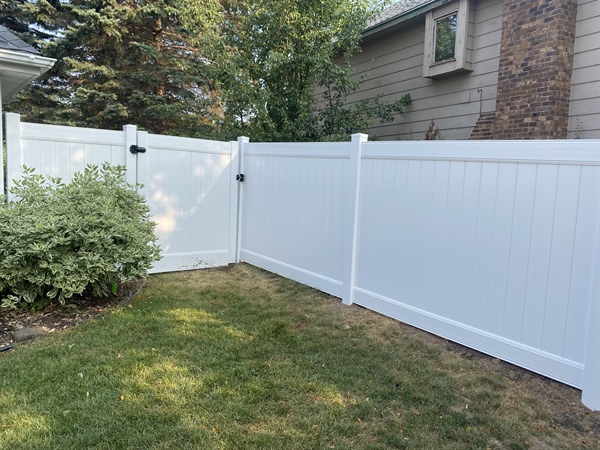Wood vs. Vinyl Fencing: Which Is Best for Your Backyard?

Choosing the right fencing material for your backyard is crucial to not only enhance its appearance but also ensure longevity and ease of maintenance. When it comes to selecting between wood and vinyl, homeowners often find themselves weighing various factors. This article discusses the key considerations, including durability, maintenance, environmental impact, installation, and the provision of privacy and security offered by wood and vinyl fencing.
In the sections that follow, we will explore five critical questions: Which fence material lasts longer? What’s the maintenance difference between wood and vinyl fencing? Which is more eco-friendly: wood or vinyl fencing? How do vinyl and wood fencing compare in terms of installation? Which fencing option offers better privacy and security? Each of these questions aims to guide you through the decision-making process, helping you choose the material that best suits your needs and preferences.
Comparing Durability: Wood vs. Vinyl Fencing
Vinyl fencing is renowned for its longevity and durability. Unlike wood, vinyl does not rot, warp, or succumb to pest infestations, which typically affect wooden fences. Vinyl fences can last for decades with minimal maintenance, often outliving their wood counterparts. They are also resistant to harsh weather conditions, including rain, strong winds, and extreme temperatures, making them a lasting investment for homeowners.
On the other hand, wood fences, while offering a classic aesthetic, require regular treatments and maintenance to extend their lifespan. Wood is susceptible to environmental factors such as moisture and termites, which can significantly reduce its longevity unless properly treated and maintained. Typically, a well-maintained wood fence can last between 15 to 20 years.
When considering a durable fencing solution, vinyl fencing emerges as a clear leader, offering longevity without the frequent need for maintenance or replacement.
Maintenance Needs: Wood vs. Vinyl Fencing
Maintenance requirements for fencing materials are crucial for many homeowners. Vinyl fencing offers a low-maintenance solution, needing only occasional cleaning with soap and water to maintain its appearance. It does not require painting or staining and is not prone to cracking or splintering.
Wood fencing, however, demands more consistent care to preserve its condition and appearance. It typically needs to be cleaned, painted, or stained every few years to prevent decay and moisture damage and to maintain its color and protective coatings. This ongoing maintenance can add to the long-term cost and effort of owning a wood fence.
For homeowners seeking a hassle-free option, wood fencing provides natural beauty but requires more upkeep compared to its vinyl counterpart.
Eco-Friendliness: Wood vs. Vinyl Fencing
When assessing the environmental impact of fencing materials, wood fences generally come out ahead as they are made from a natural, renewable resource. Most wood for fencing comes from sustainably managed forests, and it is completely biodegradable at the end of its life.
Vinyl fencing, while not biodegradable, offers benefits in its longevity and low maintenance requirements, reducing the need for frequent replacements and the use of harmful chemicals for maintenance. However, the production and disposal of vinyl fencing involve the emission of toxic chemicals and are not as environmentally friendly as wood.
Overall, wood fencing is typically considered more eco-friendly due to its natural composition and minimal environmental impact during production and disposal.
Installation Comparison: Wood vs. Vinyl Fencing
Installation is another important factor to consider when choosing between wood and vinyl fencing. Vinyl fencing is relatively easier to install due to its uniformity and the interlocking mechanism of its panels. It can be installed faster than wood fencing, which may require more customization and time to fit the specific layout and design of a property.
Wood fencing, while offering a traditional and customizable option, often requires more time and skill for installation. Each wooden fence panel might need individual treatment and fitting, which can extend the installation process.
For those considering a quick and efficient installation process, vinyl fencing often provides a more straightforward and less labor-intensive solution.
Privacy and Security: Wood vs. Vinyl Fencing
Both wood and vinyl fencing can be designed to offer excellent privacy and security. Vinyl panels typically come in solid or near-solid styles, which offer great privacy and are difficult to climb, enhancing security. Their durability and lack of gaps ensure a secure perimeter for long periods.
Wood fencing also provides robust privacy options, especially with styles like board-on-board or stockade that feature overlapping panels. However, wood may require more frequent inspections and repairs to ensure there are no gaps or weak spots as the material ages or is affected by the elements.
Ultimately, both materials offer strong privacy and security features, but the choice may depend on the specific needs and preferences of the homeowner, as well as the level of upkeep they are willing to undertake.
Enhance Your Property with the Right Fencing
Choosing the right fencing material is more than just a cosmetic decision; it's about finding the right balance of durability, maintenance, environmental impact, installation ease, and security. Whether you value the natural beauty and customizability of wood or the durability and low maintenance of vinyl, understanding your needs is the first step towards making an informed decision.
At FenceIn Deck, we offer a comprehensive range of fencing solutions tailored to meet these diverse requirements. Our expertise in both wood and vinyl fencing allows us to provide personalized advice and installation services that align with your aesthetic preferences and functional needs.
If you're ready to enhance your property with new fencing or have further questions about the best material for your backyard, don't hesitate to reach out. Contact us today for a free estimate and discover how we can help you build the perfect fence for your home.